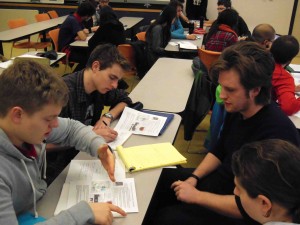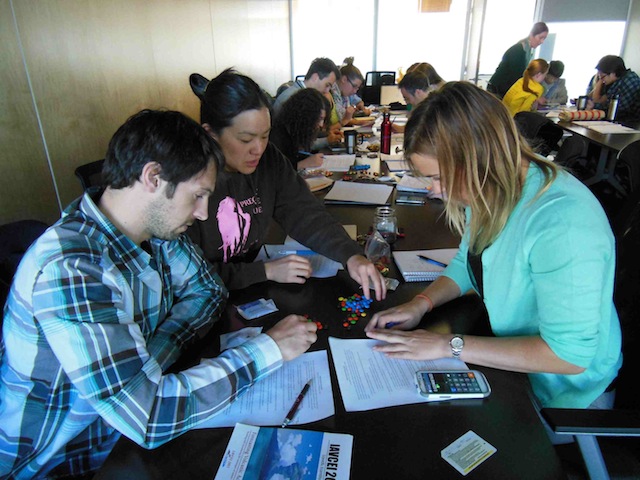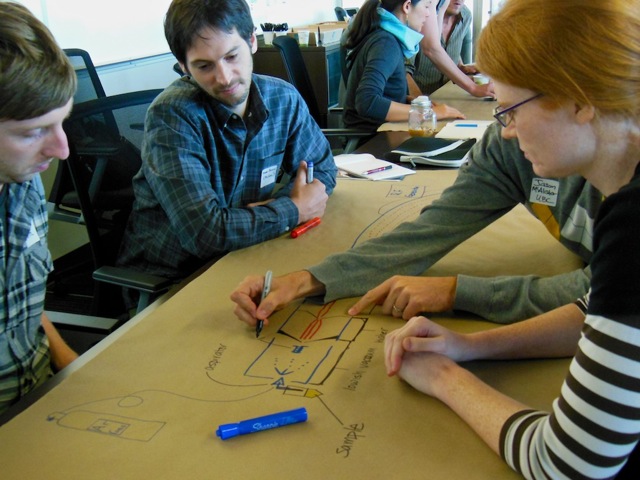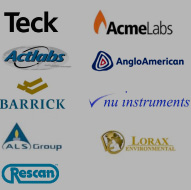Sunday June 8, 2014 – 9:00am to 12:00pm
Sacramento Convention Centre, CA
Students learn best when they actively manipulate course content, connect it to their own knowledge, and explain to each other concepts as they learn them. In the Faculty of Science at the University of British Columbia (Canada), we are nearing the end of a 7-year project to transform teaching, the Carl Wieman Science Education Initiative. Carl Wieman is a Nobel Prize-winning physicist who has been focusing on improving Science education in recent years. The CWSEI has been very successful and in the Earth, Ocean, and Atmospheric Science department and our courses have changed dramatically for the better. One of the cornerstones of this transformation is the use of well-structured and relevant learning activities in our lectures ranging from short 5 minute exercises to integrated 50 minute problems implemented in classes with small (20 students) to large (>100 students) enrolments. These activities create strong connections between concepts addressed in class and in lab, allow students to practice vital skills, and result in a high level of engagement and discussion between students.
In this half-day workshop, you will experience a handful of our more successful activities as our students do, discuss how they are successful and how they could be modified for other courses, and begin to develop activities for your own classes. This workshop is targeted at senior graduate students, postdoctoral fellows, early career faculty, and anyone who wishes to reinvigorate their teaching.
Example activities: comparing in-situ analytical techniques (left), stable isotope systematics with M&Ms (middle), drawing a MC-ICP-MS (right).
Workshop Registration:
US$69 regular, US$58 student (includes 1 refreshment break)
Register online at: Goldschmidt 2014
Links & Resources:
- Carl Wieman Science Education Initiative: www.cwsei.ubc.ca
- EOS Science Education Initiative: www.eos.ubc.ca/research/cwsei/
Presenter Bios:
Brett Gilley has been working as a Geologist and an Educational Developer since 2003. He completed his Masters Degree in Earth Science at Simon Fraser University and has been developing teaching workshops, designing courses, and alternately inspiring and scaring students since then. He has taught at more post-secondary institutions in the Vancouver area then he cares to admit, and has been working as a Science Teaching and Learning Fellow in the Department of Earth, Ocean and Atmospheric Sciences at the University of British Columbia for the past 7 years. Brett hopes he is unable to resolve his apparent career dichotomy any time soon.
James Scoates is Professor of Geology in the Department of Earth, Ocean and Atmospheric Sciences at the University of British Columbia, where he has served on the faculty since 2002. He received his BScH from Queen’s University in 1987, his PhD from the University of Wyoming in 1994, and began his teaching career as a faculty member in geology at the Université Libre de Bruxelles in Belgium (1995-2002). James has somehow ended up teaching 20 different courses over the past 20 years. Although initially a skeptic, his experience with the CWSEI over the past 5 years has resulted in application of active learning in all his undergraduate and graduate courses with successful implementation at professional short courses and geological field trips. In his spare time, his research interests are focused on the intersection of igneous petrology, geochemistry, and geochronology in unraveling the magmatic evolution of mafic layered intrusions and flood basalts and their associated magmatic ore deposits.
Diane Hanano completed her BScH (2004) in Geology & Oceanography and MSc (2008) in Geochemistry at the University of British Columbia. After a brief stint as a consultant in the mineral exploration sector, she joined the Department of Earth, Ocean and Atmospheric Sciences at UBC in 2011. Diane is responsible for project management, industry partnerships, public relations, outreach and education for the Pacific Centre for Isotopic and Geochemical Research (PCIGR), for the Multidisciplinary Applied Geochemistry Network (MAGNET), and the Canadian office of the International Ocean Discovery Program (IODP). She is also a massive Pearl Jam fan.











 Site by Sprout Creative
Site by Sprout Creative